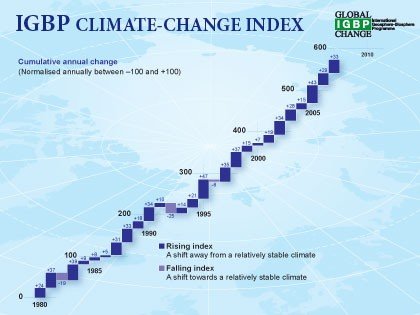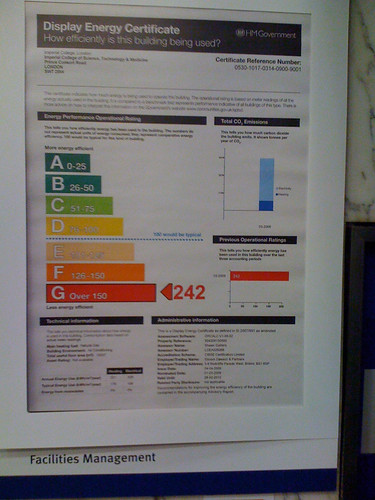Today I went to a talk by Chris Rapley, a Professor at UCL and currently director of the Science Museum in London (across the quad from Imperial), “Climate Change: Who Should I Believe?”.
In a department full of academic scientists (including a few working on the climate, such as our head of department, Professor Jo Haigh) there was a sense of preaching to the converted: we’ve already evaluated the evidence, or, at least, done our best to evaluate those presenting the evidence — even scientists don’t have the time, inclination or expertise to go back to the original data in all cases.
Rapley reminded us of the basic cycles moving carbon around the planet, and transporting heat from the sun to the earth and, over time, back out to space (one important fact is that we need the greenhouse effect to make the Earth livable to begin with — the airless, carbon-dioxide-free moon is about 30 degrees colder than the earth) in a careful balance that we have adjusted our civilization over millennia to take advantage of — it may not be the best of all possible climates, but it is the one that many, many trillions of dollars and billions of lives depend on. (In 1997, Costanza et al, Nature 387, 256, estimated that the ecosystem was “worth” about $33 trillion per year, almost twice global GDP.)
To boil this down, the International Geosphere-Biosphere Programme has created a unified “Climate Change Index” which attempts to summarize the climate in the same manner as the Dow Jones or FTSE indices do for the stock market, combining global average temperatures, sea level, and arctic ice cover (physicists will complain that these each have very different units, so that there is some arbitrariness to the combination, but it does reduce the noise inherent in any one of these indicators).
It’s been a bad thirty years for the climate.
Meanwhile, The NY Times argues that climate change is real, despite isolated mistakes in the IPCC report, and despite the evidence from the (possibly illegally hacked) University of East Anglia emails that scientists are, indeed human. (As Rapley put it, it would likely be illuminating to trawl 10,000 emails from the climate-change deniers.) Unfortunately, the upshot seems to be that we scientists must be “above reproach” whereas the deniers can lie through their teeth (or at least misrepresent the facts, seemingly wilfully or not).
Finally, leaving my office this evening, I noticed this poster:
It seems my workplace is part of the problem, not the solution.

